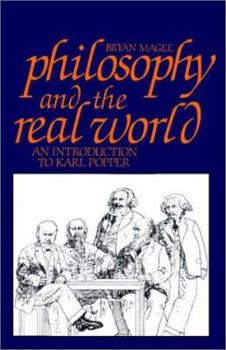Philosophy and the Real World: An Introduction to Karl Popper
No Synopsis Available.
Format:Paperback
Language:English
ISBN:0875484360
ISBN13:9780875484365
Release Date:January 1999
Publisher:Open Court
Length:120 Pages
Weight:0.43 lbs.
Dimensions:0.4" x 6.0" x 8.7"
Customer Reviews
4 ratings
Clear Introduction to Popper
Published by Thriftbooks.com User , 18 years ago
This book provides a very short introduction to the ideas of Karl Popper; it was endorsed by Popper as an accurate reflection of his views. I became interested in this introduction after reading Magee's Confessions of a Philosopher: A Personal Journey Through Western Philosophy from Plato to Popper. The details in that book that interested me most related to Popper's philosophy of science along with his defense of a free society; these ideas are discussed in slightly more depth in this book. The discussion regarding the proper role of scientific method as envisioned by Popper and contrasted with the traditional role is one that I found to be of particular interest and would recommend to any others who are involved or interested in scientific pursuits. Popper believed that scientific laws can never be proven (verified), but that they can be refuted (falsified) such that the best scientific theories are those that are highly falsifiable (hence, highly testable). From this standpoint, growth in scientific knowledge comes through finding instances where our existing theories are not applicable; therefore, in some sense, it is more admirable for a scientist to prove a theory wrong than it is to show that it holds for a certain condition. Popper claimed, "The wrong view of science betrays itself in craving to be right." Magee comments that such an outlook is liberating even outside the sciences since it promotes the idea that "...shortcomings are to be actively sought out, not concealed or passed over...critical comment from others, far from being resented, is an invaluable aid to be insisted on and welcomed." As far as the political ideas of Popper are concerned, he thought that free and open societies were the ideal for purely practical reasons--quite apart from moral considerations. Popper argued that societies which encouraged the free exchange of ideas and criticisms were more efficient at improving themselves than were those societies that restricted the flow of information and ideas. As Magee summarizes, "...not only do authorities which forbid critical examination of their policies condemn themselves to making many of the mistakes in a more expensive form...[they] condemn themselves to pressing on with mistakes for some time after these have begun to produce injurious consequences. The whole approach, characteristic of highly authoritarian structures, is anti-rational." Popper saw the guiding principles for these open societies as being to "minimize avoidable suffering" and "maximize the freedom of individuals to live as they wish." I found this book to be very enjoyable and easy to read. Magee is an excellent writer and illustrates concepts very clearly for the layperson. This book has increased my interest in Popper and I look forward to reading some of him first-hand. I would recommend this book for those interested in Popper, philosophy of science or political philosophy.
Fine Overview
Published by Thriftbooks.com User , 18 years ago
This is a lucid and concise overview of the philosophy of Karl Popper. Magee covers Popper's philosophy of science, philosophy of history, epistemology, and political philosophy in a series of well written chapters that also provide a reasonable amount of background information. The themes are Popper's emphasis on the provisional nature of knowledge, the important of vigorous criticism and falsification, constant questioning, and the importance of intellectual diversity. Magee is particularly concerned with demonstrating the underlying unity of Popper's thought and does a good job of connecting Popper's epistemology with his political philosophy. Magee's enthusiasm for Popper is obvious, perhaps to the extent of being a little uncritical. There are certainly precedents for Popper's fallibalist epistemology which Magee doesn't mention. Based on Magee's account, I don't think that Popper has really overcome the induction problem or that his evolutionism really rebuts empiricism.
Magisterial introduction.
Published by Thriftbooks.com User , 23 years ago
Bryan Magee summarizes in this small book superbly the work of Karl Popper: the elimination of the induction problem, the falsification criterion as a demarcation between science and non-science, the characterization of marxism as well as the Enlightment (the perfectibility of man) as historicisms, the responsibility of the individual.The best possible introduction to the work of one of the most important philosophers of all times.
unended tribute.
Published by Thriftbooks.com User , 25 years ago
Karl Popper was the celebrated author of a good number of philosophy of science books. Reading this book by B Magee on Pooper one can follow very complex and far reching concepts of the man with ease. The clearity in which Mr Magee explores the key ideas on history, science and methapisics of him decerves praise. The books could have been a tiresome account of Popper theories and abstract conceps but insted is an engaging narrative of ideas and their crucial inportance in the history of scientific discovery and the relation to history it self. Karl Pooper decerves to be read more and Brian Magee has given us to oportunity to know why. Magee knew Popper well (Confessions of a philosopher), and not only he loved him, but respect him most for his thoughts and inteligence. After reading this introduction of Popper ideas one can not help doing the same for both of them.





